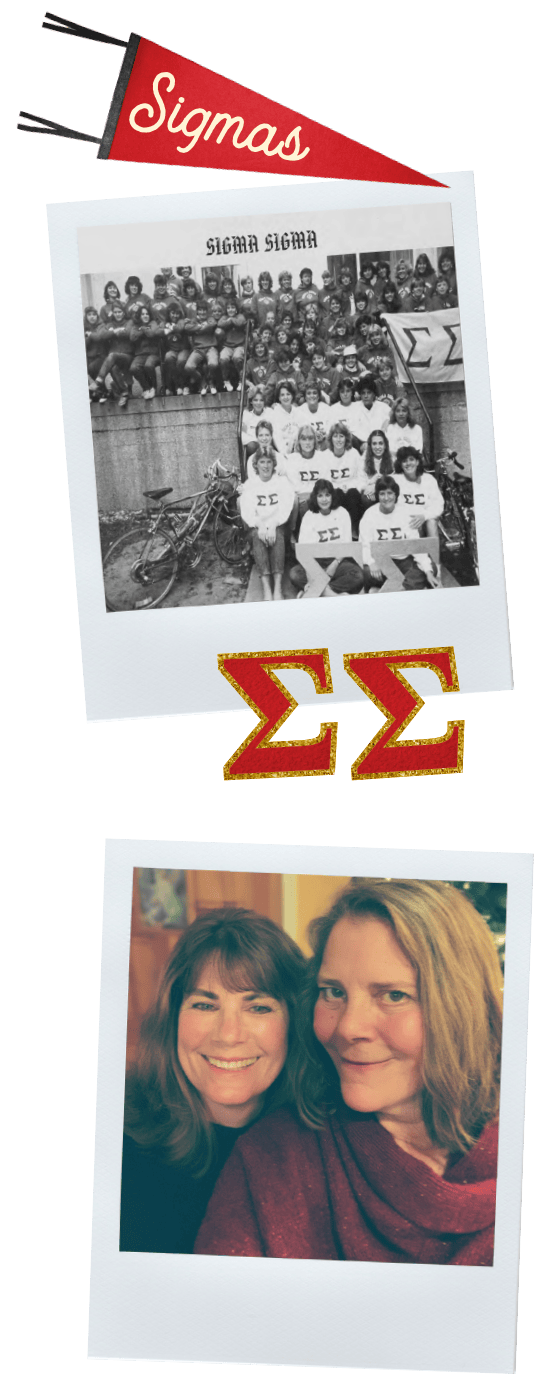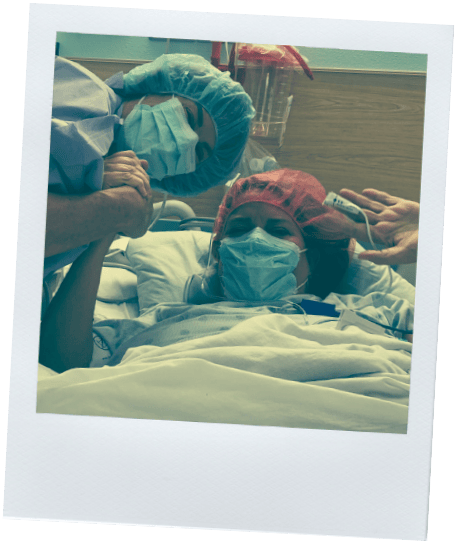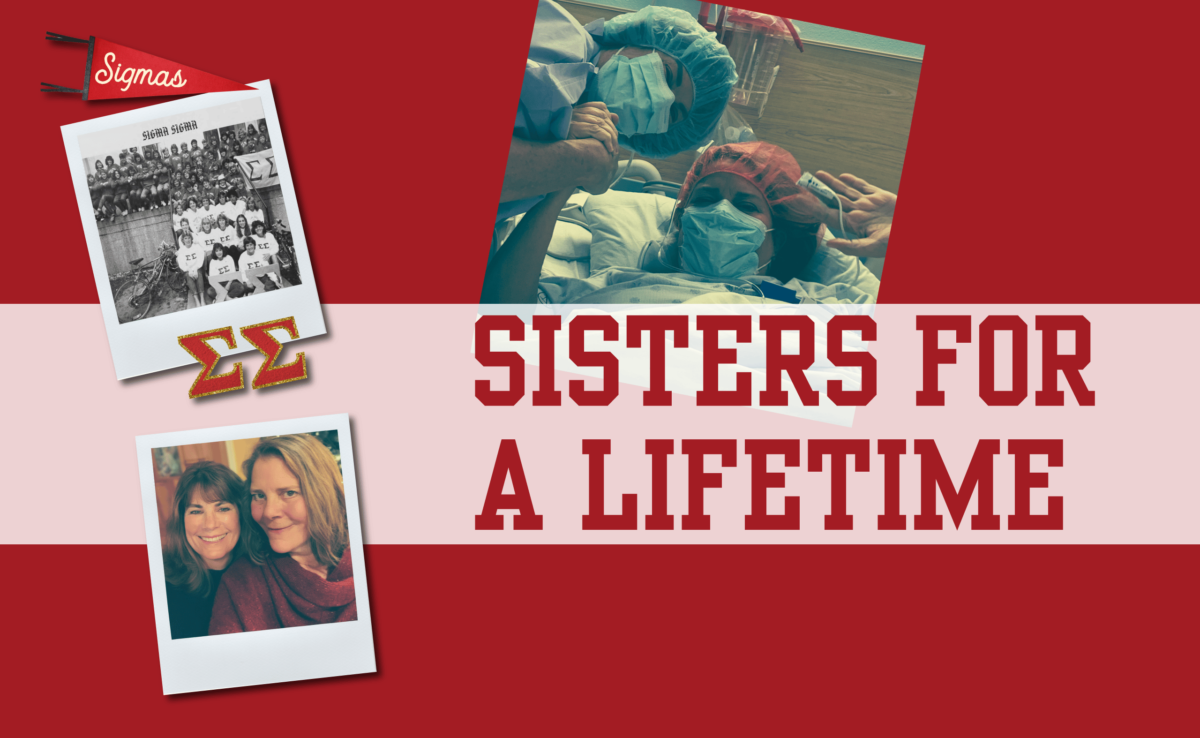Sisters for a Lifetime

This is the most remarkable story you will read in this issue of News from Hope College.
Or most any other magazine, for that matter.
It’s about two women, both Hope College alums, born in the same hospital — the now-assimilated Blodgett in Grand Rapids — two years apart. Improbably, both mothers named their infant daughters Karen Sue.
But wait, it gets better. Both — Karen Heffner ’85 Broekstra and Karen Visscher ’87 — pledged as members of Sigma Sigma, the oldest sorority on campus. A few years after graduating, Visscher hired Broekstra to join her when Visscher was director of student academic services at Aquinas College.
It was while working there that Vissch, as her Sigma sisters called her, discovered she had polycystic kidney disease, an inherited disorder in which fluid-filled sacs grow on the kidneys, causing them to swell enormously and eventually lose function. She inherited the condition from her mother, who ultimately needed a transplant.
“I remember she came back from an ultrasound appointment and had tears in her eyes,” Broekstra recalls. “She said, ‘Oh my gosh, I’ve got what my Mom had. That means someday I’ll need a kidney transplant.’ We hugged. It was an emotional moment.”
The two Sigmas eventually went on to other roles elsewhere, both moving out of state.
Years passed.
The disease progressed.
After months on dialysis, in October 2022 Visscher, now in Albuquerque, New Mexico, did indeed receive her life-saving transplant. And guess who the donor was?
Aw, you’re running ahead! That’s right: Heff — who now lives in The Woodlands, Texas — donated her kidney so that Vissch could return to a relatively normal life. “And we were a perfect match, too!” Broekstra exclaims. “The doctors couldn’t get over what a match we were. It almost makes me think I might be related to her!”
She is now. Talk about Sigmas in service. You’ve heard of kissing cousins? Meet kidney sisters. One could surmise that the lives of these Karen Sues have been consistently intertwined since they were born, and now forever will be. Some might say it’s all just a string of interesting but random coincidences.
Some didn’t attend Hope College.
One could surmise that the lives of Karen Heffner ’85 Broekstra and Karen Visscher ’87 have been consistently intertwined since they were born, and now because of a kidney transplant forever will be. Some might say it’s all just a string of interesting but random coincidences. Some didn’t attend Hope College.
One who did was Jenny VanderHart ’87 Foster of Ann Arbor, Michigan, Vissch’s friend since their freshman year and also a Sigma sister, whom Visscher asked to serve as her advocate in the search for a living kidney donor. Living-donor transplants tend to function better and last longer than organs from deceased persons. However, as is the case with many people who need transplants, Visscher says, “They [her transplant team at the University of New Mexico Hospital, near her home] kept telling me to get a live donor, but I’m the type who doesn’t want to ask. No way would I ask someone for that.”
VanderHart had no such qualms. “We’ve been really great friends since freshman year, so when she called I was more than happy to help,” she says. “I have pretty good organizational skills and I’m kind of a doer, which I think is partly why Karen asked me.”
The two composed an appeal and posted it on Facebook, where many of their Sigma sisters, members of the Hope family and others saw it. One potential donor stepped forward, but didn’t meet all the criteria. Then fate stepped in.
Broekstra hadn’t seen the Facebook post and had no idea of the O.K.’s plight. Then one afternoon she was enjoying lunch at Sandy Point Beach House with several of her Sigma Sigma besties. “Someone said, ‘Gosh, did you see Jennifer VanderHart’s post about Karen needing a transplant? And it’s almost beyond time. It should have been done long ago.”
Broekstra immediately flashed back to that tear-filled hug at Aquinas College. “I hadn’t thought about it again until that moment,” she says. “I didn’t say anything. I just listened. But I called Jennifer later and said, ‘Hey, I’m going to do this. What are my next steps?’”
No misgivings? “Inner peace,” she says. “I really, truly just handed it to God, and I believe He pulled it all together and made it possible. I also believe Karen is an incredible person who has so much more to give. She is the most unconditionally loving person I have ever met. No one cracks me up more. She’s a gift, and she worked so hard to stay alive. So from the get-go, I just knew it was meant to be.”
Broekstra made numerous trips to Albuquerque for testing and interviews; each time, she stayed at Vissch’s home. “They ask you 500 times if you’re going to back out,” Broekstra says. “They even ask you on the operating table. But I had no doubts from the minute I decided to do it. And it was beautiful to rekindle that friendship with her. You know, with Hope people you just pick up where you left off.”
“They ask you 500 times if you’re going to back out. They even ask you on the operating table. But I had no doubts from the minute I decided to do it. And it was beautiful to rekindle that friendship with her. You know, with Hope people you just pick up where you left off.”
For Vissch, the friendship and her appreciation include not only Heff but Broekstra’s family — husband Scott Broekstra ’83 and daughters Mackenzie and Kelby. “It takes an entire family unit to support a donor, and their attitude helped me accept the blessing of this huge life-giving donation,” she says.
At one point, doctors detected a spot on Visscher’s thyroid. It ended up being of no concern, but it delayed the transplant for four months. The COVID-19 pandemic didn’t help either. But finally, last October the medical science miracle took place.

Sorority sisters from both Visscher’s and Broekstra’s classes joined them via Zoom to offer prayers and encouragement just before the transplant. Because they were in separate rooms, Broekstra sought out Vissch for a hug before being wheeled to the OR.
“I was walking around in this hospital gown with the back wide open,” she recalls. “I found Karen, and as I turned around to leave, just before they rolled her off, I basically mooned her. Which was a typical Sigma thing to do.”
How’s Vissch doing today? Her secondhand kidney is functioning well, and all tests so far are promising. But as organ recipients know, a transplant is a treatment, not a cure.
“I’m thankful to be alive, and I’m thankful everything is going well,” she says. At the same time, for example, she’s found the post-transplant medicine side effects can be challenging.
“You look forward to your transplant for years, then you realize there’s a lot that comes with it. You don’t want to sound like you’re complaining, but you have to curb your expectations because there’s still a lot to deal with afterwards. But I’m so happy to be alive.”
Happiness shared, in large measure, by her Sigma Sigma sisters. “I feel the friendships you get at Hope College are some of the most meaningful relationships you’ll ever have in your lifetime,” Heff reflects. “That was my experience.”
Editor’s Note: Author Jim McFarlin ’74 brought a particularly informed perspective to this story, which in addition to his talent made him the first choice, bar none, when News from Hope College was seeking a writer for it. Jim is also a kidney transplant recipient, and like most recipients knows the exact date of his “second birthday”: November 18, 2011. The onetime ESRD (End-Stage Renal Disease) patient representative for the state of Illinois, he chairs a monthly support group for organ donors, recipients and those awaiting transplants, and is active in a wide range of kidney and transplant-focused organizations and activities.
If you are interested in learning more about being a live-transplant kidney donor, please visit the website of the National Kidney Foundation of Michigan and go to “The Big Ask, The Big Give” under Programs.

